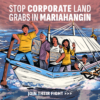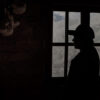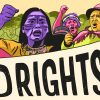Land Rights Now recently spoke with Carlos Morales, the coordinator at UVOC (the Unión Verapacense de Comunidades Campesinas), who hails from the Verapaces region of Guatemala. In this region, Indigenous and rural people are suffering from an epidemic of violent evictions caused by state-endorsed corporate farmers, who are attempting to establish monoculture plantations on the ancestral territories of local people. Carlos and his colleagues at UVOC are committed to defending Indigenous land and territories in country. Read on to learn more about Carlos’ perspective on evictions and what land means to Mayan Indigenous communities.
Hello Carlos, thank you for meeting with us today. What can you tell us about the current crisis of evictions faced by Indigenous and rural people in Guatemala?
The evictions [against Indigenous and rural people] have been happening for more than 500 years. At this point I feel as though we are broken records, but this is our reality. In all of these years, the situation has not improved. In fact, the situation has worsened, and the group that has retained [political] power in Guatemala does not allow changes to the situation.
On top of this, climate change is in sight. Everybody talks about climate change as a joke, but it is not a joke– we are seeing the impacts of climate change every day. Today it is 24 degrees, when before it was 16 degrees. I had a call from members of a community who told me “it is the third time we’re sowing corn this year and it doesn’t grow, what are we going to do?” The Indigenous and peasant communities rely on those crops to survive, so what is going to happen in a few months? These are the effects of the increasing droughts that our communities are observing on a daily basis.
Can you explain to us what is at stake for Mayan Indigenous communities from the Verapaces?
The territory is where we maintain our culture. Where our ancestors lived. This is where we have learned to name what our world is, where we have been built as people, where we have grown from the wisdom of our elders. And since I can remember, we have repeatedly asked the different Governments to solve the agrarian conflicts over our lands, but none of the politicians and representatives have ever been interested in doing anything. So what is left of us? As Indigenous Qe’qchi, Poqomchi’, Achi, and peasant communities what remains is to resist and defend our territories so they cannot destroy it, so we can continue living in them, and leave this as a legacy to our children. This is our fight.
That sounds like an incredibly difficult situation, as we understand that, for land defenders such as yourself, it is impossible to stand up for land rights without retribution before or during evictions.
Maintaining the fight is very hard because of criminalization faced by leaders of the communities who defend human rights to land. That criminalization is quite strong. And all institutions are now captured by the people in power, so it’s very difficult to find public servants willing to attend to our demands about human rights and land rights. We’re seeing leaders arrested, assassinations, and many persecuted comrades.
We have seen that in evictions the military, police, and armed citizens attack us with as many as 3000 soldiers, 2000 policemen, and 100 armed civilians. Many people have been injured during evictions and they have not been able to get medical attention because they are detained at the health post or in the hospital. So the situation is very serious. We have seen fellow comrades being injured, one compañero has lost an eye, another has a broken jaw, another has a broken spine and is in a wheelchair.
In such a perilous situation, what happens to communities after evictions occur?
It is hell, what happens to the families after evictions. Everyone loses everything, they raze their corn, kill their animals, and then families have to leave [their land]. The women and children go looking for some relatives or friends to salvage what they can, and often must stay with them for a month or two months And after that they have to leave, but where? And if men get killed during the evictions, what happens with the widows? And their kids? UVOC have been supporting widows who lost their husbands during evictions looking for food and shelter. . . the other thing is chronic malnutrition. Without their corn this happens, and they get diseases that the strong do not get. Education is totally lost. Husbands must leave to get some work, get something to eat, and return only every two months, and this is where the family disintegration comes in. Where are the human rights of these people? We are talking about housing, health, and education. . . here there are no rights for the Indigenous population.”
Thank you for sharing your experiences with us Carlos. Speaking to an international audience, what would you like people to know about what is happening in Guatemala? How can they support the work being done by UVOC?
We need people to stand in solidarity towards the atrocities that are taking place in Guatemala. We need statements from important institutions to show what is happening in Guatemala. And they have to name things as they are, they have to talk about the human rights violations against Indigenous and peasant communities. If I would choose a title for an international statement about Guatemala it would be “The hell of the indigenous people in Guatemala.” We need the international community to know what is happening.



